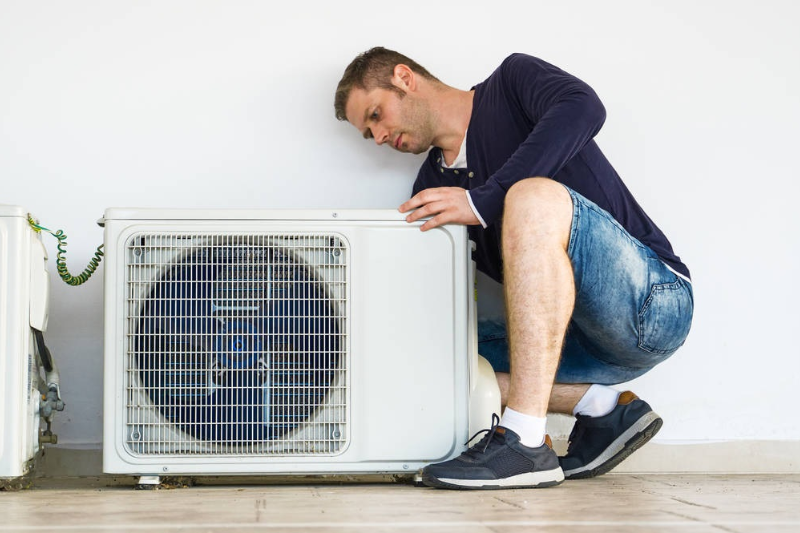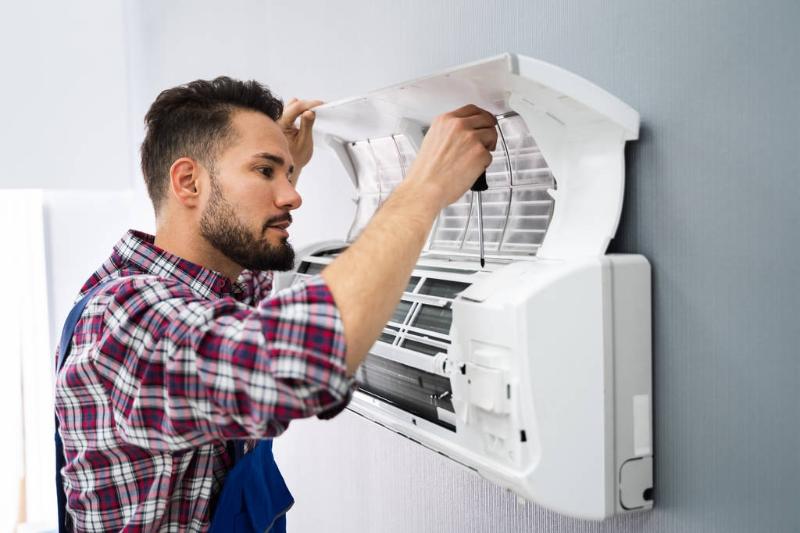Table Of Contents
Are you struggling to find the right air conditioner for your home? Choosing the correct size air conditioner is crucial to ensure optimal comfort and energy efficiency. An appropriately sized air conditioner will cool your residential property effectively. At the same time, an incorrectly sized unit can lead to issues like high energy bills, poor cooling, and premature wear and tear on the system.
Know the Importance of a Properly Sized AC
Energy efficiency
Properly sizing your air conditioner ensures it operates at its peak efficiency, saving you money on utility bills in the long run. In most cases, homeowners prefer split systems due to their efficiency.
Comfort and performance
A correctly sized air conditioner maintains a consistent and comfortable indoor temperature, preventing hot and cold spots in your home. It ensures the system runs optimally without constant cycling or struggling to reach the desired temperature.
System longevity
Oversized or undersized air cons can lead to tear and wear on the system. By selecting the proper size, you can extend the lifespan of your unit and minimise the need for costly repairs or replacements.
Humidity control
Properly sized air conditioners effectively dehumidify the air, creating a more comfortable indoor environment. Oversized units cool the room quickly but may not run long enough to remove excess humidity, leading to a damp and uncomfortable atmosphere.
Noise reduction
An appropriately sized air conditioner operates at a level that doesn’t produce excessive noise. Oversized units are noisier due to frequent cycling, while undersized units may run continuously, creating a constant background hum.
Factors When Determining Air Conditioner Size
Now that we understand the importance of sizing, let’s look into the factors to consider to find the perfect fit for your home:

Climate
Are you living in a region with scorching summers or milder temperatures? The climate in your area plays a vital role in determining the size of your air conditioner. Hotter climates generally require higher cooling capacities to combat the relentless heat.
Insulation
How well is your home insulated? Good insulation helps keep cool air inside and prevents hot air from infiltrating your space. Proper insulation can significantly reduce the cooling load on your air conditioner, allowing it to work more efficiently.
Home size and layout
The size of your home and the layout of its rooms are crucial factors in determining the cooling requirements. Larger homes or spaces with high ceilings and open floor plans tend to have higher cooling demands. Additionally, multi-story homes may have varying cooling needs on different levels.
Windows and sunlight exposure
Windows bring in natural light and views, allowing heat to enter your home. The number, size, and orientation of windows affect the heat gain. South and west-facing windows receive more sunlight and contribute to increased cooling needs.
Occupancy and usage
How many people live in your home? Do you have heat-generating appliances or equipment? The number of occupants and heat-generating sources impact the cooling load. For example, a kitchen with frequent oven use may require additional cooling capacity.
Future expansion
Consider any plans for home additions or renovations. If you’re expanding your living space, it’s essential to account for the increased cooling requirements in your sizing calculations.
Calculating Cooling Capacity

Calculate the square footage
Measure the length and width of each room and multiply them to get the square footage. For irregularly shaped rooms, divide them into sections and determine the square footage for each section separately.
Determine the cooling load
Consider insulation, windows, sunlight exposure, and heat sources. Use a cooling load calculator or consult an HVAC professional to accurately calculate each room’s cooling load.
Sum up the cooling loads
Add up the cooling loads for all rooms to obtain the total British Thermal Unit (BTU) capacity needed for your home. This will help you determine the right size for the air conditioner.
Consult an HVAC professional
It’s beneficial to seek advice from an HVAC professional who can verify your calculations and provide expert recommendations based on their experience and knowledge.
Consider zoning
If your home has different cooling needs in other areas, consider using zoned air conditioning systems to optimise efficiency and comfort.
The Impact of Oversized and Undersized ACs

Oversized air conditioners
An oversized unit cools the room quickly but tends to cycle on and off frequently. Frequently cycling leads to inefficient energy use, temperature fluctuations, and discomfort. Additionally, oversized units may not adequately dehumidify the air, resulting in a humid indoor environment.
Undersized air conditioners
An undersized unit runs continuously to cool the space, straining the system and consuming more energy. It struggles to reach the desired temperature, leaving your home uncomfortable and humid.
Matching AC Size to Your Home’s Square Footage
General guidelines
As a starting point, for homes up to 1,000 square feet, a cooling capacity of 18,000-21,000 BTUs is typically recommended. However, these are rough estimates, and other factors specific to your home should be considered for accurate sizing.
Square footage range
For premises between 1,000 and 2,000 square feet, cooling capacities of 21,000-30,000 BTUs are generally suitable. Larger homes above 2,000 square feet may require cooling capacities exceeding 30,000 BTUs.
Consult an HVAC professional
While square footage provides a starting point, consulting with an HVAC professional is essential to accurately assess your home’s cooling needs. They will consider additional factors and perform precise calculations to determine the ideal size for your air conditioner.
Energy efficiency considerations
Besides sizing, look for energy-efficient models with high Seasonal Energy Efficiency Ratio (SEER) ratings to optimise energy savings and reduce environmental impact.
Don’t oversize for future expansions
Avoid oversizing your air conditioner for future home expansions or renovations. Oversized units will not cool your current space efficiently and may lead to increased energy costs and discomfort.
Common Mistakes to Avoid When Sizing Your AC
As you embark on the journey of sizing your air conditioner, keep an eye out for these common pitfalls:
Guesswork and assumptions
One of the biggest mistakes people make is relying on guesswork or assumptions when sizing their air conditioners. It’s essential to take accurate measurements, perform proper size calculations, and consider all relevant factors instead of relying on estimations.
Neglecting professional input
Many homeowners underestimate the expertise of HVAC professionals. While it’s possible to perform the calculations yourself, seeking professional advice can provide valuable insights and prevent costly mistakes. HVAC professionals have the knowledge, experience, and tools to accurately assess your home’s cooling needs.
Ignoring the importance of insulation
Insulation plays a crucial role in determining your home’s cooling load. Neglecting insulation can lead to inaccurate sizing calculations. Ensuring your home is adequately insulated is essential to optimise your air conditioner’s performance and prevent energy wastage.
Overlooking windows and sunlight exposure
Windows and sunlight exposure contribute significantly to the heat gain in your home. Failing to account for the size, orientation, and number of windows can lead to improper sizing. South and west-facing windows, in particular, receive more sunlight and increase the cooling demand. Consider options like reflective films or shades to minimise heat transfer.
Neglecting changes in home configuration
If you’re upgrading or replacing your air conditioner, it’s essential to consider any changes in your home since the original unit was installed. For example, if you’ve added rooms or improved insulation, your cooling requirements may have changed. Reassessing your needs ensures you select the appropriate cooling capacity for your current configuration.
Failing to consider lifestyle changes
Changes in occupancy or living habits can impact your cooling needs. For instance, your cooling requirements may have increased if you’ve had an addition to the family or started working from home. Adjusting your calculations accordingly ensures your air conditioner can handle the new demands.
Use Expert Advice for AC Unit Sizing
Sizing your air conditioner is undoubtedly a critical task, and you might be wondering whether to go the do-it-yourself route or seek professional guidance. Here’s what you should consider:
Expertise and accuracy
HVAC professionals have specialised knowledge and training in sizing different brands of air conditioning units. They have the expertise to accurately assess your home’s cooling needs, considering factors like square footage, insulation, climate, and window exposure. Their calculations are based on industry standards and can provide precise recommendations tailored to your requirements.
Comprehensive assessment
When you consult an HVAC professional, they will thoroughly evaluate your home. They consider not only the size of your home but also factors such as the layout, number of occupants, heat-generating appliances, and future expansion plans. This comprehensive assessment ensures that the recommended cooling capacity accounts for all relevant variables.
Proper equipment selection
HVAC professionals have in-depth knowledge of different air conditioner models and their specifications. They can guide you in selecting the most suitable unit based on your preference and budget. They will consider factors like energy efficiency ratings, features, and warranties to help you make an informed decision.
Compliance with building codes
Local building codes may have certain requirements for air conditioner installations. HVAC professionals are well-versed in these regulations and can ensure that the selected unit meets all code requirements. This ensures a safe and compliant installation, avoiding any potential legal or safety issues.
Optimised energy efficiency
Sizing an air conditioner involves finding the right balance between cooling capacity and energy efficiency. HVAC professionals can help you achieve this balance by selecting an air conditioner that matches your cooling needs without oversizing. This ensures your system operates efficiently, minimising energy consumption and reducing utility bills. Such options include split system air conditioners.
Long-term cost savings
While seeking professional advice may involve an initial cost, it can lead to significant long-term savings. A properly sized air conditioner will operate efficiently, reducing energy waste and preventing the need for frequent repairs or premature replacements. By investing in professional guidance, you can make a cost-effective decision that saves you money over the life of your air conditioning system.
Find Your Ideal Air Conditioner Size Today
Now that you have a comprehensive understanding of the factors involved in selecting the proper size air conditioner for your home, it’s time to take action. Don’t settle for an air conditioner that’s too big or too small for your home. Instead, consult with HVAC experts to find the ideal-size AC for your home or commercial business.
They can help you choose the perfect fit and enjoy cool, comfortable living all summer long. Consult with the experts today and take action to find your ideal air conditioner size and make your home or business a haven of refreshing coolness.



